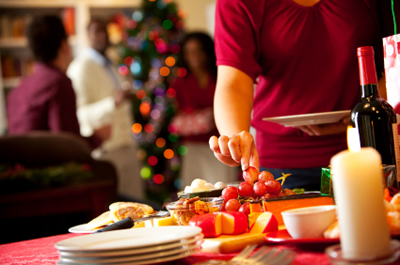
Holiday Healthy Weight Challenges
by Dr. Jennifer Warren, M.D.
The season of parties, friends, and food is arriving, and many people face the holidays with mixed feelings.
On one hand we look forward to socializing, fun, and reconnecting with people. On the other hand, we may be concerned about the challenges this season presents: endless, tempting food which seems designed to play on our "comfort eating" instincts; shorter, colder days which make outdoor exercise less appealing; and busy social calendars, crammed with events which include alcohol, treats, and friends who are indulging freely while encouraging you to do the same!
A recent Swedish study has shown that overeating for just four weeks can cause changes in body fat composition that last for years. Other studies have shown that friends have a huge influence on each other's behavior. The good news is other studies show friends can positively influence each other's behaviors as well as negatively influence them.
A 2007 New England Journal of Medicine article studied 12,067 people, and found that "A person's chances of becoming obese increased by 57%...if he or she had a friend who became obese in a given interval." The paper also stated that "physiological imitation might occur; areas of the brain that correspond to actions such as eating food may be stimulated if these actions are observed in others."
To make matters even more challenging, many people feel they have a "hibernation instinct" which kicks in during the fall, almost like a mild version of "seasonal affective disorder."
Some people notice increased cravings for carbohydrates, lower energy, increased appetite, sleepiness, or loss of motivation.
There is ongoing research about how food itself affects the neurochemicals of appetite. Some foods, such as those high in saturated fat, actually appear to INCREASE our appetite for up to three days after we eat it, while choices such as meals higher in lean protein and fiber can help control our appetite by triggering satiety.
As you think about planning your meals, remember that your choices can help keep your appetite in check.
There is good news about exercise: new studies show that with careful planning you can achieve fitness in shorter exercise sessions than previously thought. Even 15-minute walks (especially if done with short "speed intervals") may help to keep your metabolism brisk.
More good news: there is new research about vitamin D, insulin resistance, and how these may affect your weight. Vitamin D insufficiency is quite common in New England. You may choose to ask your medical provider for a blood test to see if your level is in the optimal range.
 |
Here are seven tips to help you to thrive through the season:
- When it comes to Holiday foods, adopt a "Love It, Need It, or Leave It" policy.
Save your "special treat" calories for foods you REALLY love. Don't waste them on high calorie food you can get any time of the year, or treats that don't taste really fantastic. Remember, you can always be a "taster," if you don't love it, don't finish it - leave it! - Be careful to keep up your healthy basic eating this time of year.
Eat three meals of healthy lean protein, high fiber whole fruits, vegetables and whole grains, and a little bit of "good fat." Do not skip entire meals to save calories. This can slow your metabolism, and lead to out-of-control overeating later, often of the wrong choices! Save special desserts and treats for AFTER a healthy meal or snack. - Keep up with your routine exercise plan, despite temptations to "just take a break" for the holiday season.
Exercise can be the single most important factor when it comes to your health during this time. In addition to the calorie and metabolic benefits, exercise can help you relax, control stress, re-energize you, and clear your head during the whirl and confusion of the holidays. Make this a top priority for yourself and your family - be a role model for them, and encourage them to participate. A neighborhood walk can also be a great way to reconnect and bond with family. - Planes, Trains, and Automobiles – Don't get "caught hungry."
Whether you're traveling to visit family or just heading to the mall for holiday shopping, plan ahead by bringing healthy portable snacks for yourself and companions. Don't get stuck with only high calorie, nutrient-poor options. Bring along a few healthy protein bars, some dried fruit and nuts, and bottled water - portable healthy options that can save you in a pinch. - Plan Ahead for Parties
Before the party, eat a snack with protein - this can help you stay in control when faced with a buffet. If you're bringing an item, make it a healthy choice such as a fruit/veggie/yogurt plate, or lean protein such as shrimp, chicken kabobs on skewers, or vegetarian or turkey chili.
Once you arrive, don't head straight to the food. Find your hosts and start with a low calorie drink such as flavored water or a spritzer, and then socialize. Minimize the alcohol - it can make you lose control with food, among other things! When you do head to the buffet, choose a small plate, and scan for healthy starter items, and then special treats (see Tip #1!). - When you're the Host of the Party
Plan some non-food oriented activities such as family walks to gather balsam, holly, and sea shells for wreaths, centerpieces or crafts. Have an ornament painting party with simple wooden shapes and acrylic paints. Turn on music and encourage kids (and adults) to dance. Play family games such as Pictionary, bingo, or hold a Yankee Swap. Encourage guests to bring home leftovers. You may want to invest in some inexpensive containers to facilitate this! - Take care of yourself, so you can enjoy time with others.
If you're over-tired and cranky, you won't be any fun at all! Take some "down time" for yourself - don't over-commit - and make adequate sleep a priority. Relax with whatever method works for you - meditation, yoga, stretching, listening to music, dancing, reading, or being creative with arts and crafts, knitting, writing, or painting, for example. If your family is lucky, perhaps you'll share some of these activities with them!

Dr. Jennifer Warren grew up on Boston's South Shore and has family on Cape Cod. She currently lives in New Hampshire with her husband and kids.
She's a graduate of Tufts University School of Medicine, a diplomate of the American Board of Family Medicine, and the only New Hampshire Physician certified by the American Board of Bariatric Medicine.
After completing advanced training in medical weight management, Dr. Warren developed her comprehensive program, and founded Physicians Healthy Weight Center in 2004. Since then, she has helped patients lose tens of thousands of pounds.
Dr. Warren lectures to other physicians locally and nationally on weight management, and has volunteered in the development of programs to combat childhood obesity, serving on the obesity expert panel of the NH Foundation for Healthy Communities, and HEAL (Healthy Eating Active Living).
Dr. Warren has been featured as a medical weight management expert in both local and national media outlets. She is a frequent contributing medical expert for Allure magazine, Women's Health magazine, and has been a lecturer for WebMD University. Dr. Warren also co-hosted her own radio show, "Healthy Weight Talk" on WGIR in Manchester.
Phone: 603-379-6500
Fax: 603-379-6502
![]()
Dr. Warren's Healthy Weight Blog site: http://www.healthyweightcenter.blogspot.com/
